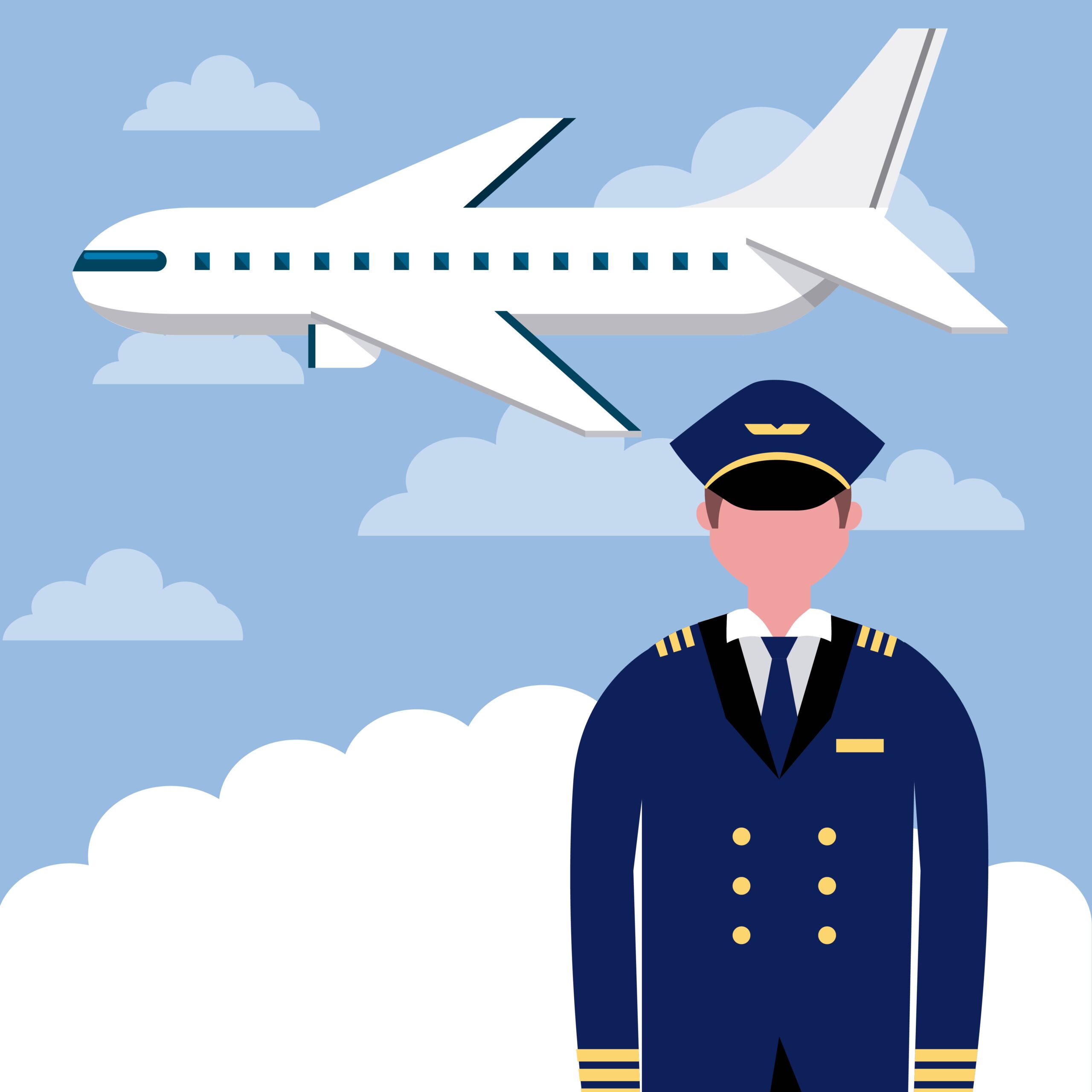Greetings, aviation enthusiasts and aspiring pilots! If you’ve ever looked up at the sky and wondered about the financial rewards of an Airline Pilot Salary, you’re in for a treat. Today, we’re unraveling the salary stratosphere for airline pilots in the USA. Buckle up; this flight is all about the dollars and sense of soaring through American skies.
Table of Contents
Top-Grossing Airline Pilot Salary
Delta, American, United – Oh My!
When it comes to the crème de la crème of airline pilot salaries in the USA, the major players take center stage. Delta Air Lines, American Airlines, and United Airlines are the heavyweight champions of compensating their captains handsomely.
Insider Insight: Rumor has it, some of these captains could buy their own private jets with the change they find in their couch cushions.
Delta’s Compensation Philosophy
Beyond the Skies: A Commitment to Pilots
Delta Air Lines stands as a beacon of excellence in the aviation industry, and this commitment extends to how they compensate their pilots. The airline places a strong emphasis on acknowledging the skill, experience, and dedication that each pilot brings to the cockpit.
Core Values: Delta’s compensation philosophy is rooted in fairness, transparency, and a recognition of the pivotal role pilots play in ensuring safe and reliable air travel.
Commanding Heights: How Much Does a Delta Captain Earn?
Captaining an aircraft for Delta is not just a position; it’s a prestigious role that comes with a corresponding salary. Delta’s Captain salaries are known to be among the highest in the industry, reflecting the responsibilities and expertise required to lead a flight.
In the Numbers: While specific figures may vary based on factors like experience and aircraft type, Delta captains often enjoy a base salary supplemented by bonuses, profit-sharing, and other performance-related incentives.
Additional Perks and Benefits
Beyond the Basic: The Delta Advantage
Delta Air Lines understands that a competitive salary is just one piece of the puzzle. Pilots at Delta enjoy a suite of additional perks and benefits that sweeten the deal:
- Travel Benefits: Delta’s pilots and their immediate family members often have access to discounted or complimentary travel on Delta flights, making vacations and exploration more accessible.
- Health and Wellness: Delta prioritizes the well-being of its employees, offering comprehensive health and wellness programs, including medical, dental, and vision coverage.
- Retirement Planning: Delta provides robust retirement plans, ensuring that pilots can look forward to a comfortable and secure future after their aviation careers.
Career Progression and Development
Ascending the Ladder: Delta’s Career Development Approach
Delta Air Lines is not just about compensating pilots for their current role; it’s about investing in their future. The airline encourages career development and progression, providing opportunities for pilots to enhance their skills, qualify for different aircraft, and ultimately advance in their careers.
Growth Opportunities: Delta often promotes from within, fostering a culture of continuous learning and advancement. This not only benefits the individual pilots but contributes to the overall expertise and proficiency of Delta’s pilot community.
The Delta Difference
Why Delta? A Comprehensive Approach to Compensation
Delta Air Lines distinguishes itself not only through its impressive fleet and impeccable service but also through its comprehensive approach to pilot compensation. From competitive salaries to a holistic benefits package and a commitment to career development, Delta ensures that its pilots are not just employees but valued contributors to the airline’s success.
Delta vs. American Airlines Pilot
When comparing the pay structures for pilots at American Airlines and Delta Air Lines, it’s important to note that the specifics can vary based on factors like experience, aircraft type, and other individual considerations. However, we can provide a general overview of how these two major U.S. carriers approach pilot compensation.
American Airlines:
1. Competitive Base Salaries: American Airlines offers its pilots competitive base salaries, with figures varying based on the pilot’s rank and experience. Captains typically earn higher base salaries than First Officers.
2. Additional Compensation: Pilots at American may receive additional compensation in the form of bonuses, profit-sharing, and performance-based incentives. These can significantly augment their overall earnings.
3. Comprehensive Benefits: American Airlines provides a comprehensive benefits package, including health and wellness programs, retirement plans, and travel privileges for pilots and their families.
4. Career Development: American Airlines emphasizes career development, offering opportunities for pilots to advance their skills, transition to different aircraft, and climb the ranks within the organization.
Delta Air Lines:
1. High Base Salaries: Delta is known for offering some of the highest base salaries in the industry. Captains at Delta typically enjoy substantial base pay, reflecting the airline’s recognition of their experience and leadership.
2. Performance-Related Incentives: In addition to base salaries, Delta pilots may benefit from various performance-related incentives, including profit-sharing. This can add a significant bonus to their overall compensation.
3. Extensive Travel Benefits: Delta provides generous travel benefits, allowing pilots and their families to fly at discounted or complimentary rates, fostering a culture of exploration and adventure.
4. Holistic Compensation: Similar to American Airlines, Delta offers a holistic compensation package that goes beyond salary, encompassing health benefits, retirement plans, and opportunities for career growth.
Considerations:
- Industry Standards: Both American and Delta adhere to industry standards for pilot compensation, but the specifics can vary based on negotiations, industry trends, and company policies.
- Negotiation and Contracts: Pilot compensation is often subject to negotiation during collective bargaining agreements. The terms and conditions are outlined in these contracts, which are periodically renegotiated.
- Variable Factors: While base salaries are crucial, other factors like work schedules, quality of life, and the overall work environment can influence a pilot’s perception of the overall compensation package.
In summary, both American Airlines and Delta Air Lines are recognized for offering competitive and comprehensive compensation packages for their pilots. The decision between the two may depend on individual preferences, career goals, and lifestyle considerations. As with any career decision, it’s crucial for pilots to carefully evaluate the complete compensation package, including salary, benefits, and career development opportunities.
American Airlines vs. Unites Airlines Pilot Pay
American Airlines:
- Competitive Base Salaries: American Airlines offers competitive base salaries for its pilots. The exact figures depend on factors such as rank (Captain or First Officer), experience, and aircraft type.
- Additional Compensation: Pilots at American may receive additional compensation through various mechanisms, including bonuses, profit-sharing, and performance-based incentives. These can contribute significantly to the overall earnings.
- Comprehensive Benefits: American Airlines provides a comprehensive benefits package, encompassing health and wellness programs, retirement plans, and travel privileges for pilots and their families.
- Career Development: American emphasizes career development, offering opportunities for pilots to advance their skills, transition to different aircraft, and progress in their careers within the organization.
United Airlines:
- Competitive Base Salaries: United Airlines is known for offering competitive base salaries. Like American, the specific figures depend on factors such as rank, experience, and the type of aircraft flown.
- Incentives and Bonuses: United, similar to other major carriers, may provide pilots with incentives and bonuses. Profit-sharing and performance-based bonuses can contribute significantly to the overall compensation package.
- Travel Benefits: United Airlines offers travel benefits to its employees, allowing pilots and their families to enjoy discounted or complimentary travel on United flights.
- Comprehensive Benefits: United, like American, provides a comprehensive benefits package that includes health and wellness programs, retirement plans, and other perks to enhance the overall compensation package.
Differences:
- Industry Standards: Both American and United adhere to industry standards for pilot compensation, but the specifics can vary based on negotiations, industry trends, and individual company policies.
- Collective Bargaining Agreements: Pilot compensation is often determined through collective bargaining agreements. The terms and conditions of these agreements are subject to negotiations and can influence the overall compensation package.
- Variable Factors: While base salaries are crucial, other factors like work schedules, quality of life, and the overall work environment can impact a pilot’s perception of the overall compensation package.
In summary, both American Airlines and United Airlines are major carriers with a focus on competitive pilot compensation and comprehensive benefits. The decision between the two may depend on individual preferences, career goals, and lifestyle considerations. Pilots should carefully evaluate the complete compensation package, including salary, benefits, and career development opportunities when making a decision.
JetBlue and Southwest Airlines Pilot Pay
While the major carriers dominate the salary leaderboard, some boutique airlines are making waves in the compensation game. JetBlue Airways and Southwest Airlines, known for their unique corporate cultures, also offer attractive packages that give pilots plenty to smile about.
Insider Tip: Smaller airlines often provide a more tight-knit community and a chance for pilots to stand out in their careers.
JetBlue Airways:
- Base Salaries: JetBlue is known for offering competitive base salaries for its pilots. The specific figures can vary based on factors such as rank (Captain or First Officer), experience, and the type of aircraft flown.
- Incentives and Bonuses: Pilots at JetBlue may receive additional compensation through various incentives and bonuses. Profit-sharing and performance-based bonuses contribute to the overall earnings.
- Travel Benefits: JetBlue provides travel benefits to its employees, allowing pilots and their families to enjoy discounted or complimentary travel on JetBlue flights.
- Comprehensive Benefits: JetBlue offers a comprehensive benefits package, including health and wellness programs, retirement plans, and other perks.
- Culture: JetBlue is known for its positive company culture and has been recognized for providing a good work environment.
Southwest Airlines:
- Base Salaries: Southwest Airlines is recognized for offering competitive base salaries for pilots. Similar to other airlines, the specific figures depend on factors such as rank, experience, and the type of aircraft operated.
- Profit-Sharing: Southwest is famous for its profit-sharing program, where employees, including pilots, may receive a share of the company’s profits.
- No Frills Culture: Southwest has a unique “no-frills” culture, focusing on efficiency and cost-effectiveness. This approach is reflected in the overall compensation structure.
- Comprehensive Benefits: Southwest provides a comprehensive benefits package, including health and wellness programs, retirement plans, and travel privileges.
Differences:
- Profit-Sharing Model: One notable difference is Southwest’s emphasis on profit-sharing, which can significantly impact the overall compensation for its employees, including pilots. JetBlue may also have profit-sharing elements, but the emphasis might differ.
- Company Culture: JetBlue is often praised for its positive and employee-friendly company culture, while Southwest is known for its unique and vibrant company culture.
- Route Structures: The route structures and operational focus of the two airlines differ. Southwest has a point-to-point system, while JetBlue may operate more of a hub-and-spoke model in certain markets. The operational differences may influence factors such as work schedules and lifestyle.
- Negotiation and Contracts: Pilot compensation is often subject to negotiation during collective bargaining agreements. The terms and conditions are outlined in these contracts, which are periodically renegotiated.
In summary, both JetBlue Airways and Southwest Airlines are reputable carriers with competitive pilot compensation packages. The decision between the two may depend on individual preferences, career goals, and lifestyle considerations. Pilots should carefully evaluate the complete compensation package, including salary, benefits, and company culture when making a decision.
Conclusion
In the intricate tapestry of pilot compensation, the choices between American Airlines, Delta, United, JetBlue, and Southwest unfold with distinct narratives. Legacy carriers American, Delta, and United stand as stalwarts, offering robust compensation packages, bonuses, and comprehensive benefits, creating a tale of stability and growth. JetBlue enters the scene as a formidable contender, blending competitive salaries with travel perks, adding a touch of modernity to the storyline. Finally, Southwest, with its renowned profit-sharing model, introduces a refreshing pragmatism, making a mark as a unique character in the aviation narrative. As pilots consider their next destination in this drama, each airline offers a script with its own merits, waiting to be written into the chapters of their careers. May their journeys be smooth and their flight paths clear. ✈️




